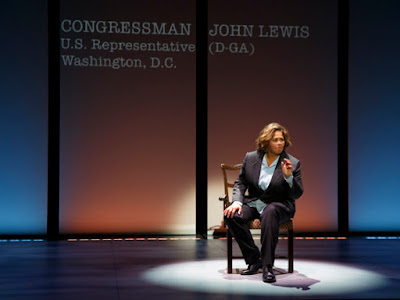Notes from the Field
Written and performed
by Anna Deavere Smith; directed by Leonard Foglia
Performances through December
11, 2016
Second Stage Theater,
305 West 43rd Street, New York, NY
2st.com
 |
| Anna Deavere Smith in Notes from the Field (photo: Joan Marcus) |
We need Anna Deavere Smith more than ever. Her form of documentary theater—where
she “plays” real-life individuals discussing whatever subject she has to hand,
starting with Fires in the Mirror,
about the Crown heights riots, and continuing with Twilight Los Angeles 1992, House Arrest and Let Me Down Easy—returns with Notes from the Field, another
provocative and wide-ranging exploration of a peculiarly American problem: the
uneasy relationship between education and the penal system.
The starting point for Smith is the police killing of Freddie Gray in
Baltimore. But Smith is after something more substantial than simple racial
politics: she charts a more systematic failure in how people who need help are
treated, often being thrown them in prison instead. The words of the NAACP’s Sherrilyn
Ifill—who bookends the show with remarkably clear-headed pronouncements on
race, education and prison—puts it into perspective by saying “one of the huge
investments that we made was in the criminal justice system. And that
investment was made at the expense of other investments.” Namely, she
elaborates, education and mental illness. And so it begins…
Smith introduces school officials like Philadelphia principal Linda
Cliatt-Wayman and teacher Stephanie Williams, who continue fighting the good
fight even while having little in the way of ammo to fight with, as Williams
willingly admits: “It's like me running a jail without a gun…I can’t throw you
in a closet, I can't do any of that. It's just like, I gotta keep you in order
just by being me!”
There’s Pastor Jamal-Harrison Bryant, speaking to an emotionally charged audience
at Gray’s memorial service, where he gives his own take on why Gray ended up
dead in the back of a police van: “in a subtlety of revolutionary stance, (Gray)
did something that black man were trained to—taught—know not to do. He looked
police in the eye. I want to tell this grieving mother, you are not burying a
boy, you are burying a grown man. Who knew that one of the principles of being
a man is looking somebody in the eye.”
And, most poignant of all, there’s John Lewis, Congressman and former 1960s
civil rights protestor, who was seriously injured marching with Martin Luther
King. Lewis’s story about meeting ex-Klan members who apologize to his face for
their viciously racist actions against him and them crying genuine tears over
it is heartrending and hopeful.
As always, Smith’s chameleon-like ability—indeed, genius—to bring out the
nuances in 19 very different people underlines the fact that this is a moral
dilemma, not a partisan one, which is something we desperately need during this
uncertain time in our country. Leonard Foglia’s astute direction shifts the
visuals often enough to keep the performance from stagnating—particularly the use
of a video camera to bring subjects into closer focus—and the appearance of Marcus
Shelby occasionally playing an upright bass, which at times enters into a duet of
sorts with Smith that makes the subject matter even more urgent.
No comments:
Post a Comment